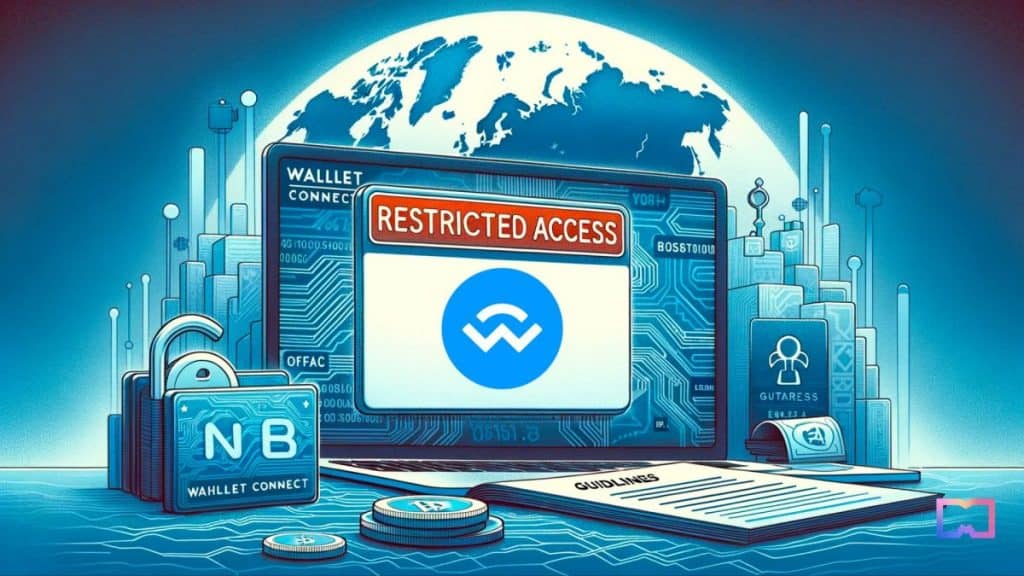WalletConnect Cuts Off Access in Russia Following New Government Directives
In Brief
The American web3 entity WalletConnect has declared that it will restrict its services in Russia starting October 30, adhering to OFAC guidelines.

US-based web3 startup WalletConnect, The company’s decision to limit its services in Russia follows the latest legal instructions and guidance from the U.S. Treasury's Office of Foreign Assets Control (OFAC).
WalletConnect primarily serves as a bridge between blockchain wallets and decentralized applications, also known as dApps, a role that is becoming increasingly vital as the realm of decentralized finance (DeFi) and dApps continues to expand.
Since at least 2021, OFAC has been actively monitoring cryptocurrency transactions within Russia. The ongoing conflict between Russia and Ukraine has prompted numerous Western countries to impose sanctions on Russia. In 2021, OFAC issued recommendations expressing the expectation that operators of virtual currencies would bear similar responsibilities in preventing sanctions violations as conventional financial institutions.
WalletConnect's CEO, Pedro Gomes, clarified that the company's actions were fully aligned with OFAC guidelines. He also addressed any misunderstandings regarding the consequences for Ukraine.
He mentioned that WalletConnect had briefly limited access from certain Ukrainian IPs during this process, but this restriction was temporary, allowing services to resume quickly for unaffected areas of Ukraine.
In response to earlier claims that WalletConnect had obstructed access from non-sanctioned nations, the platform firmly denied these allegations and expressed apologies to users for any inconveniences faced.
Dear WalletConnect community,
— WalletConnect (@WalletConnect) October 31, 2023
In accordance with the latest directives from legal and OFAC authorities, WalletConnect has limited the accessibility of its protocol within Russia. Some regions in Ukraine experienced a temporary service interruption, but availability has since been restored.
We sincerely apologize for any… pic.twitter.com/tg5FicCh4g
This action sheds light on the growing challenges blockchain platforms experience as they try to navigate intricate regulatory frameworks across various countries. Russia, with its unique regulatory stance on cryptocurrencies, has consistently been a topic of debate among the global crypto community.
It also emphasizes the ever-changing and complicated nature of the regulatory frameworks that platforms like WalletConnect must deal with. As the crypto sector continues to adapt to the fluid international regulatory landscape, decisions like these highlight the critical need to comply with global regulations to maintain the integrity and sustainability of the crypto ecosystem.
Navigating an Increasingly Complicated Crypto Regulatory Landscape
It’s crucial to acknowledge that U.S. sanctions have been particularly rigorous against crypto services in Russia and the Middle East, particularly given the ongoing geopolitical conflicts.
The U.S. Department of Treasury and legislators are actively crafting laws to tackle the financing of terrorism and warfare through digital currencies.
The Financial Crimes Enforcement Network (FinCEN) has proposed new regulations aimed at strengthening oversight of crypto mixing services, while Senator Elizabeth Warren has garnered support for legislation focused on crypto-related fundraising for terrorism.
These changes come amidst rising concerns regarding the credibility of information concerning crypto and terrorism financing, underscoring the necessity for accountability and nuanced regulation in the crypto landscape.
Disclaimer
In line with the Trust Project guidelines , it's important to note that the information on this page does not serve as legal, tax, financial, or any other type of advice. Always invest only what you can afford to lose and consult a financial expert if you're uncertain. For further details, we recommend checking the terms and conditions as well as the help and support sections provided by the issuer or advertiser. MetaversePost strives for accuracy and impartial reporting, but market conditions can change unpredictably.







